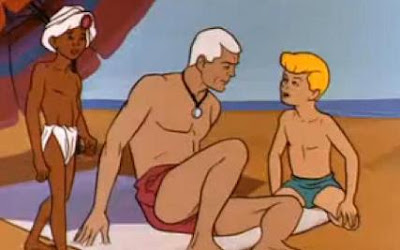The early Hanna Barbara cartoon stars -- Yogi Bear and Boo Boo, Huckleberry Hound, the Flintstones, Jonny Quest (and Race Bannon --sigh) -- were ubiquitous in my childhood in the 1960s. I don't remember much about their cartoons, but they appeared on an endless supply of toys and games. There have been many, many parodies, revisions, and rehashes over the years. Most recently, Jellystone! (2021-22) puts all of them -- including the obscure ones you've never heard of -- into the same small town, for "slice of life"-style adventures. There were virtually no female characters in the Hanna-Barbara universe, so some of them have had a gender change. I heard that there is some gay inclusivity, including Jonny Quest and Hadji as a canonical gay couple. So I watched the episode in which the two own a bowling alley.
Intro: Establishing shot of the town of Jellystone, built in Swiss chalet style, with the inhabitants in a parade: Huckleberry Hound, Yogi and Boo Boo, and so on, oddly animated but recognizable from the 1960s. The characters who have turned female all have eyelashes, a standard signifier in animation since the 1930s. Suddenly a character I don't recognize causes the buildings to all fall over in domino style.
Scene 1: Doggie Daddy, who still talks like Jimmy Durante, pushing his now-female child Augie Doggie in a baby carriage, even though he knows that she is 11 years old. She doesn't mind. They stop for a kiss break. As she walks over to a snack cart for a sandwich, he's overcome by worry. A tad over-protective.
Scene 2: Yogi, Boo Boo, and Captain Caveman approach Doggie Daddy and ask him to a "grownups only" bowling night. What, exactly, do they have planned? He wants to go, but he's afraid of leaving Augie with a babysitter.
Scene 3: Doggie Daddy's house, which is a lighthouse. He has hired Jabberjaws, now female with a Southern accent, to babysit: "Don't worry -- it will be fun. We'll talk about boys." How does she know that the 11-year old is interested in boys?
Doggie Daddy can't manage to leave Augie, so he brings her to the bowling alley disguised as an "adult friend," Dave. Adding a moustache makes her unrecognizable, in spite of the eyelashes.
Scene 4: Bowling. Augie/Dave is bad at it, but fits in by discussing stock options with Baba Louie (now female), and braiding Captain Caveman's hair. He seems to be complaining that a guy he dated was inadequate in bed: "he said he would kabunga, but he barely even kawunga-ed."
When Augie/Dave finally knocks over a pin, Doggie Daddy kissses him. The guys look on, shocked, angry -- are they homophobic, or do they suspect the deception? Doggie Daddy explains that he kisses all of his adult friends, so they line up to be kissed. I guess they're not homophobic He is disgusted by the idea of kissing guys, so he tries to rush off. They convince him to stay.
Scene 5: Johnny and Hadji, now adults, drop a disco ball so the bowlers can dance. They aren't named, and don't speak, so you'll only know who they are by reading the plot synopsis. There's no indication that they are romantic partners.
Scene 6: Morning. Making breakfast, Doggie Daddy muses that last night was horrible, but he won't have to do it again. "Goodbye, Dave." But Augie comes downstairs in her Dave moustache. She announces that she is going to brunch -- as Dave. Daddy is shocked and horrified. He can't deal with having a nonbinary or trans kid!
Always use the names and pronouns that people prefer. "Augie" is a deadname. He goes by Dave now.
A montage of Dave saying goodbye to go to an estate sale, out for tapas, and to watch the football game. Doggie Daddy screams that he's lost his daughter! But you've gained a son. And maybe he was never a daughter at all.
Scene 7: The bowling alley. Ok, it's Quest Bowling, with the same font used for the old show, so fans will know that they are Johnny and Hadji -- if they ever show up again. Dave is playing "Duck, duck, goose" with the gang.
Doggie Daddy appears and announces: "Until today, I thought that my life was a bowl of cereal, with those little marshmallows in them. But I realized that one of those marshmallows is actually..." Something phallic? Are you going to be accepting of Dave's gender identity? Nope: "A booger named Dave! I am not going to take this and pretend that everything is ok! It's not!" Way transphobic, Daddy.
He challenges David to Hock-Ma, a mega-bowling game. (Johnny and Hadji appear again to set it up). "If I win, you promise to go back to being a girl. If I lose, I'll go live in that grave over there." You're going to commit suicide rather than face having a trans kid?
The guys tell him that he's acting like a jackass, so Doggie Daddy loses deliberately. But instead of finally accepting his son, he goes to live in the grave: "That's it! I've lost my daughter forever!," he says in tears. So Augie drops the moustache and goes back to being a girl. The end.
What...no! Boo! What kind of message does that send about gender diversity? Doggie Daddy should have accepted his child, boy or girl.
And what about Johnny and Hadji. The writers tweeted that they couldn't be explicit about the couple, but "in our minds they are happily married." So you can have gay characters as long as no one watching the show has any idea that they are gay.
My Grade: F-.
See also: Yogi Bear and Boo Boo.



























